‘Recruiter’ in Paradise: This Is Work?
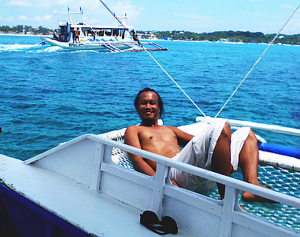
Meet Melchor Baldevieso, 32. That’s him, basking in the sunshine aboard an employer’s pontooned motorized banka, or “pump boat”, the “Princess Hanessa”, anchored in the dappled turquoise glassy waters off Crocodile Island (which is only shaped like a croc, not home to even one) in legendary Boracay, Philippines. (No sharks either, say the locals.)
He’s on the job—the job of “catching”island-hopping tourists, recruiting deckhands when needed (almost always his cousins), accompanying tourists on snorkeling, diving and sailing tours, and serving a pool of banka owners—his direct employers, including the Boracay Island Hopping Adventure corporation.
As a self-described recruiter-cum-tour guide, Melchor took me and two young mainland Chinese tourists—Linda and Tammy (shown here)—out for some fabulous snorkeling through a kaleidoscope of fish and sailing during the finale of my recent “road trip” through South East Asia.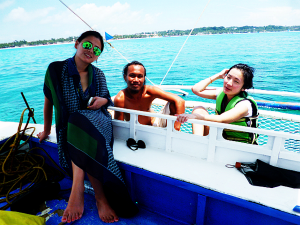
Apart from the stunning charms of Boracay’s beaches and bays, what struck me about our outing was the seeming perfection of his job that seems to bear little resemblance to work, even when the clientele don’t include the charming likes of Linda and Tammy.
This is in stark contrast to the onerous, seemingly endless toil and drudgery required by vast numbers of non-professional Filipinos to eke out a sustainable existence, especially, unskilled workers, who will toil for about 260 pesos per day outside urban areas such as Manila—about $6.50 per day or about $200 per month, which can suffice, but only as a bare subsistence income.
Melchor not only generally makes more than that, but being single, with only his father as a dependent, says he has a comfortable life with no unmet economic needs and no frustrated material desires—although he did say that if he could afford his own boat, he’d get one: approximate cost for boat and franchise—about $4,000 (160,000 pesos).
Pay-for-Play Career Perfection
His job comes with perfect workplaces that are indistinguishable from perfect play and holiday venues, while providing perfect opportunities to blur any distinction between work and play, in favor of the latter. With his pay-for-play job, Melchor’s only “labor” is what he regards as the very pleasant and indeed, for him, emotionally indispensable task of chatting up and with his target audience.
For him, the only “work” he does is in fact essential to his overall experience of fun and satisfaction. When I asked him whether he’d be content to go out on an empty boat and serve as a floating shill to entice tourists, he grimaced and said that would kill his interest in the job.
As he sees it, what makes his job perfect is the interaction with tourists in a beautiful 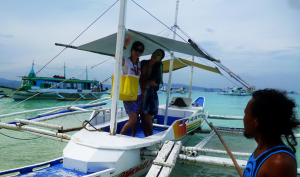
How hard does he have to “work” at “catching” clients? He says that his success rate ranges from about 1 in 7 to 1 in 10 pitches and that even just two deals a day, on average, are enough for a comfortable income and life.
Paradise Job Description
Compare the average urban recruiter job description and workplace with his (which I’ve abstracted from his responses to a series of questions I asked him in an interview):
“Required to recruit customers and staff (the latter on an as-needed basis), 7 days a week, to ensure client satisfaction and meet on-board manpower needs. Shall accompany and accommodate paying clientele during the service period. A shift shall comprise 8 hours, with 3 to 6 to be spent lounging and tanning on deck, swimming or snorkeling, feeding (in order to attract) nearby fish and chatting with clients, with a projected maximum in high season of 9 hours of such sailing relaxation.
The onshore work time shall be allocated to the solicitation of client passengers, with an expectation of an average of 1 to 2 sailings per 8-hour day. A commission of 10%-15% shall be paid, per paid booking.
When and as required, shall recruit ancillary and other staff for onboard service—relatives welcome.
Being on call or otherwise accessible in off hours is not required. In the event clients (tourists) are late, that open time shall be used to resume solicitation, pending the arrival of the booked clients, whose booking will be cancelled after a 40-minute no-show period.
Although advancement and promotion opportunities are limited at best, job security and stability are virtually guaranteed. It is estimated that the commission-based compensations will amply meet the needs and desires of an adequate local work-life balance.
Sea rescue and emergency assistance training, credentials and experience are preferred, as is familiarity with sea craft and basic navigation.”
For recruiters weary of sorting piles of resumes, being stuffed into a suit, battling daily gridlocked commutes, juggling endless phone calls, soaking up pressure—rather than sunshine—from all sides, inhaling pumped office air, squinting under fluorescent office morgue-tinted lights, wolfing lifeless sandwiches on the run, navigating city-center high-rise cold canyons, being squeezed into crowded elevators and being stuck with views of only walls or somebody else’s window, Melchor’s gig will probably seem enviable and enticing.
Greener Grass, Bluer Water—Really?
The contrast is 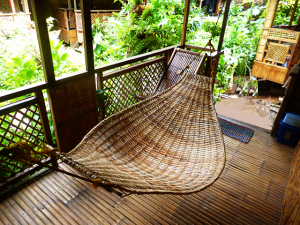
Alas, no such luck: He loves it all and all the time, as his answers to the following questions suggest:
- Do you feel you are working in paradise? “Yes. The water, the beach, the air, very relaxed atmosphere and people—all wonderful.”
- How long is your commute? “15 minutes, by boat.”
- How hard is your job? “Not at all.”
- What about the money? “I earn little money, but I’m happy with my job. That is the most important thing to me—I work and am happy with my job. It’s not about the money. You work from here (pointing)…from your heart.”
- Is there anything that you need, but cannot afford? “What I have is enough for me.”
- Is there anything that you want, but cannot afford? “No.”
- What do you enjoy about your job? “I enjoy ‘catching’ tourists, swimming, snorkeling and stuff like that, I never, never get bored. Every day I inhale and exhale fresh air from the sea. The boat is comfortable and negotiating the price is fun for me.”
- Do you every feel pressure or anxiety about getting enough passengers? “No. No worries about not finding customers.I can use my savings when I can’t find customers.”
- What about difficult, rude clientele? Any problems? “None.”
- What kind of stress do you experience? “None with the job; just problems with village gossip, envy and lies that break my dignity.” (Mostly because of his long-haired hippie image, he says.) “Taking care of my father is not stressful either.” (because his dad lives in a home he owns outright, so there’s no mortgage or rent to pay.)
- What about girl friend or marriage—Affordable? “If I have a girlfirend or wife, then I’ll have stress, especially because of the lovely tourists I meet on my job.”
- How often are you tired after working? “Never.”
- Do your employers interrupt or disturb your free time with a phone call or email? “Never.”
- How many hours a day are you looking for and being with or preparing for clients and trips? “Only 8 hours.”
- Do you feel prepared for emergencies? “Yes, I was in the Coast Guard 609 Squadron, in 2001—rescue, first aid, things like that. I was also a dive shop speedboat captain.”
- How much do you need to earn per month? “I need 9,000 pesos.”( That’s about $200 per month, which he can easily make with just one 3-hour 2,500 peso sailing per day plus tips.)
- What do you do in your free time? Different from work? “I swim, sail in sail boats, enjoy bar music, but have no TV no computer, which I don’t need, anyway. Facebook only once a week or twice a month, no smart phone.”
- How satisfied are you with your job, on a plus/minus 10-point scale ? “10.”
- For what job would you trade this one? “Movie star, model.”
- Does the beauty of Boracay ever become uninteresting for you? “Never.”
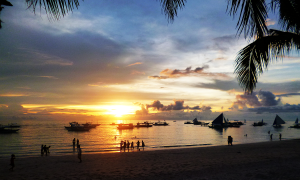
- What is the hardest part of the job, besides finding clients? “Nothing else.”
- What about the no-shows? “About, 20%, but while we’re waiting, we’re still marketing and approaching replacement tourists, so no stress.”
- Are there any special challenges? “Explaining to stubborn tourists why going to the far side of the island in dangerous weather is dangerous.”
- Future plans and dreams? “Get married to a woman who trusts me, have two kids; for me, this job is forever.”
- Do you care that this job doesn’t have any advancement or promotional potential? “No.”
As far as I can tell, his answers suggest and Melchor can see, his future is going to be a career cruise, anchored around permanent smooth sailing in his perfect paradise, which he has no interest in or intention of trading for any kind of climbing.
______________________
Note: Those interested in being recruited by Melchor, at least for island hopping, can learn more about him at his Facebook page: melchor.baldevieso@yahoo.com

